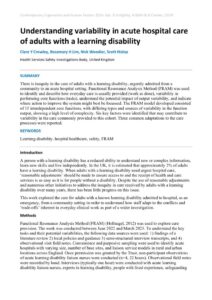| Document | Author Clare Y Crowley, Rosemary H Lim, Nick Woodier, Scott Hislop |
| Abstract There is inequity in the care of adults with a learning disability, urgently admitted from a community to an acute hospital setting. Functional Resonance Analysis Method (FRAM) was used to identify and describe how everyday care is usually provided (work as done), variability in performing core functions (tasks), understand the potential impact of output variability, and indicate where action to improve the system might best be focussed. The FRAM model developed consisted of 15 interdependent core functions, with differing types and sources of variability in the function output, showing a high level of complexity. Six key factors were identified that may contribute to variability in the care commonly provided to this cohort. Three common adaptations to the care processes were reported. |

